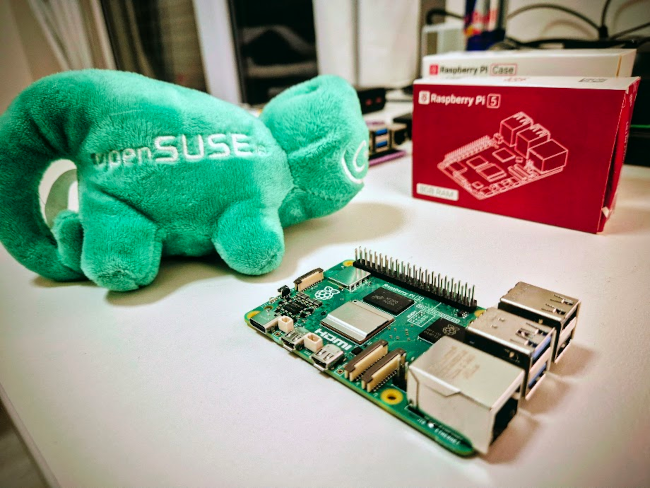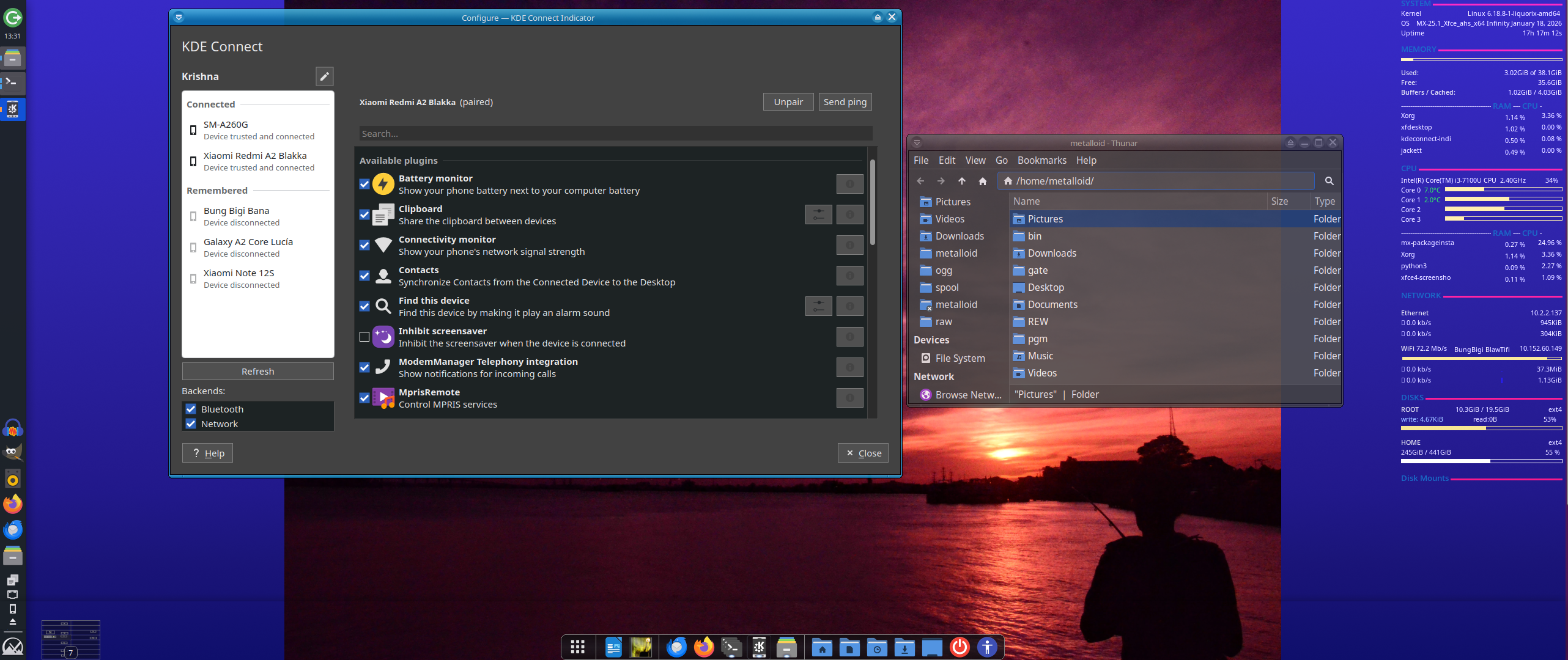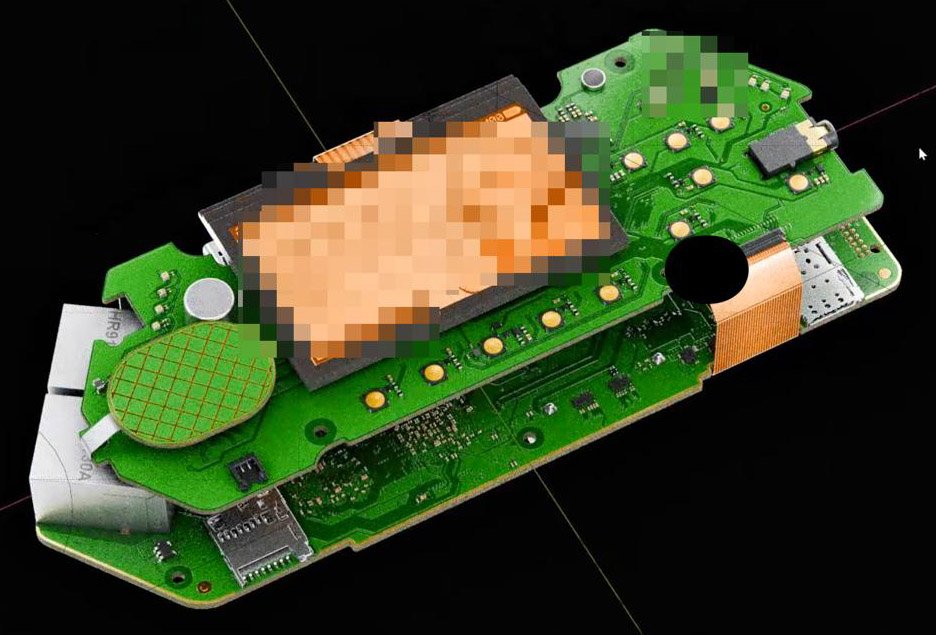#Tumbleweed boots on #RaspberryPi 5!
Thanks to U-Boot, kernel updates, and the RP1 driver, core features like Ethernet, #WiFi, USB, and #HDMI are working. A major step forward for #openSUSE on #ARM. https://news.opensuse.org/2025/11/04/raspberrypi5-opensuse/
#Tumbleweed boots on #RaspberryPi 5!
Thanks to U-Boot, kernel updates, and the RP1 driver, core features like Ethernet, #WiFi, USB, and #HDMI are working. A major step forward for #openSUSE on #ARM. https://news.opensuse.org/2025/11/04/raspberrypi5-opensuse/
@Dendrobatus_Azureus yeah I know, thats why I said it. I just think local send is over-hyped. It is meant for LAN files sharing, and this problem humanity solved in like 90s. Diffrent solutions get their own place in my heart. Syncthing for easy NAT traversal. KDE Connect for Apple like experience on any phone. Nextcloud for its web interface. In single houshold setup I'd use SMB (Wndows built-in default) or SFTP (default on Linux). Less configuration, less programs to work with. The standards.
I've read your responses to my toot twice. Thank you 💕 for reacting.
IMHO your though process does not justify the hate you've got for localsend.
Your hate towards, the for you unknown program, localsend is **unfounded*"
Cherish the fact that there is choice and diversity in OpenSource programming.
Stable release versions for synchronizing files exist since the 1970s, not the 1990s. You've clearly not been around long enough to realize that fact **
Ever since plain simple sh existed, such programs were coded. One such program was coded more than fifty years ago and is still in active use.
Please be so kind to use wisdom and intelligence when you react and respond to toots. You acted like a typical snobbish Linux user. Reactions like yours don't contribute anything positive, no one learns from toots like the ones you posted in this thread.
I've never had such responses from the people in the BSD range of Operating Systems.
Even here on the FediVerse the diverse responses from Linux only users and programmers were not of such nature and low caliber.
I'm surprised, yet paradoxically expected your motivational chain.
** If you have been around long enough, to know open source code from the 1970s, look in the mirror and ask yourself why you have reacted in such a manner .
I will still wish you a good day / night, wherever you may reside.
EOF
^Z
#KDE #Gnome #Cairo #library #Xfce4 #airdrop #localsend #kdeconnect #ftp #Linux #ARM #SBC #programming #opensource #technology
@Dendrobatus_Azureus frankly, I dont get hype around localsend. Never used it but I hate it. You must install on both ends, like KDE connect, but KDE connect gives you a lot more than just sharing a file. And if the only thing you need is filesharing, then you have plenty of solutions to choose from - most of them only need serverside, and nothing new to be installed on client. So where is benefit of localsend?
Thank you for your reaction.
Your statement
'never used localsend but hate it'
fascinates me. Can you elaborate on how your process of thought flows when you say that?
I cannot hate something I don't know, I don't test, I don't try out, and I do not even hate things or people, because it is positive energy, that I flipped around to negative energy, which benefits no one; not even me
#KDE #Gnome #Cairo #library #Xfce4 #airdrop #localsend #kdeconnect #ftp #Linux #ARM #SBC #programming #opensource #technology
I should note that you can not make the mistake of comparing KDEconnect extended capabilities with those of localsend.
They operate on totally different realms.
KDEconnect has a set of plugins which work like functional libraries. There so many that I will have to include a screenshot, just to give you a sample of what KDEconnect can actually do.
Local follows The Unix Principle; it does One thing in a does it very well.
In case you've gotten curious; you can install KDEconnect with its accompanying libraries on another working environment apart from KDE. You do not need to run a full KDE Desktop Environment.
Over here I run KDEconnect on machines which have Xfce4 running, while it's counterpart runs on a couple of Androids.
KDEconnect also runs on Ancient Android Operating Systems
The programming team of KDE does not care where you run it's wonderful software as long as you can enjoy it.
The same goes for The GNOME programming team. I run Cairo Dock ** and GPartED also on Xfce4. In fact I run many Gnome libraries in Xfce4 to have crucial functionality in many parts of the Xfce4 Desktop Environment. Without those wonderful libraries I would run a crippled version of Xfce4.
I have include screenshots from one of my energy efficient desktop computers where I will show you that I run GNOME software and KDE software in Xfce4 DE
I've just finished configuring the weather applet in Cairo Dock which gets its feed from OpenMeteo (not visible in screencap01)
**Update: Cairo Dock is programmed by it's own dedicated team. They have been doing the awesome work since 2007
In screencap 01 you see
* KDEConnect to the left
* Thunar from XFce4 to the right with important GNOME libs giving it extra functionalities
*Cairo Dock from GNOME at the bottom with advanced launch capabilities
#KDE #Gnome #Cairo #library #Xfce4 #airdrop #localsend #kdeconnect #ftp #Linux #ARM #SBC #programming #opensource #technology
@Vivaldi #vivaldi #linux #chromebook #debian
Is it correct that Vivaldi does not provide ARM64 builds for Linux?
#Neuland #Podcast - Neues aus dem Internetz: Neuland Finale 2025 und Ausblick auf 2026 - #Linux auf dem Vormarsch & nervige KI-Contentfarmen
In dieser Neuland-Ausgabe erfahrt ihr:
✅ Warum #LinuxGaming plötzlich ernsthaft konkurrenzfähig ist
✅ Wie #Windows UX-Chaos & #Werbung User vergrault
✅ Warum #ARM, #Handhelds & #Steam den Trend pushen
✅ Wie KI- #Spam & Content-Farmen das Netz fluten
✅ Warum #Google entscheiden muss, was Reichweite bekommt
✅ Wieso #Nextcloud & europäische Clouds an Bedeutung gewinnen
✅ Wie sich #Creator-Ökonomie & Wertschöpfung verändern
✅ Und weshalb 2026 das entscheidende Tech-Kipppunkt-Jahr wird.
Webseite der Episode: https://share.transistor.fm/s/77812e7d
Mediendatei: https://media.transistor.fm/77812e7d/1541d955.mp3
#Neuland #Podcast - Neues aus dem Internetz: Neuland Finale 2025 und Ausblick auf 2026 - #Linux auf dem Vormarsch & nervige KI-Contentfarmen
In dieser Neuland-Ausgabe erfahrt ihr:
✅ Warum #LinuxGaming plötzlich ernsthaft konkurrenzfähig ist
✅ Wie #Windows UX-Chaos & #Werbung User vergrault
✅ Warum #ARM, #Handhelds & #Steam den Trend pushen
✅ Wie KI- #Spam & Content-Farmen das Netz fluten
✅ Warum #Google entscheiden muss, was Reichweite bekommt
✅ Wieso #Nextcloud & europäische Clouds an Bedeutung gewinnen
✅ Wie sich #Creator-Ökonomie & Wertschöpfung verändern
✅ Und weshalb 2026 das entscheidende Tech-Kipppunkt-Jahr wird.
Webseite der Episode: https://share.transistor.fm/s/77812e7d
Mediendatei: https://media.transistor.fm/77812e7d/1541d955.mp3
Arm Comes to Project #TinyMiniMicro: Lenovo neo 50q Tiny QC
https://www.youtube.com/watch?v=yenAVRvctdQ
tl;dw: last-gen Qualcomm CPU, soldered memory, poor Linux support
Arm Comes to Project #TinyMiniMicro: Lenovo neo 50q Tiny QC
https://www.youtube.com/watch?v=yenAVRvctdQ
tl;dw: last-gen Qualcomm CPU, soldered memory, poor Linux support
For the first time we now also offer ARM64 builds for devices that boot with UEFI. This means you'll be able to run OS 8.1 on M-series Apple Silicon and devices where you can load UEFI-supporting firmware like Raspberry Pi. This version of Linux also supports certain Qualcomm and Rockchip processors, for example
Tech-Gadget Flipper One: Neue Rendergrafiken des Innenlebens geben Rätsel auf
Nach 3D-gedruckten Prototypen des Gehäuses zeigt Erfinder Pavel Zhovner nun, wie die PCBs aussehen. Wichtige Komponenten bleiben vorerst verpixelt.
Qualcomm kauft RISC-V-Spezialisten Ventana Micro
Qualcomm sieht „erhebliches Potenzial zur Erweiterung der Grenzen von CPU-Technologie“ mithilfe von RISC-V. Eine Übernahme soll helfen.
Tech-Gadget Flipper One: Neue Rendergrafiken des Innenlebens geben Rätsel auf
Nach 3D-gedruckten Prototypen des Gehäuses zeigt Erfinder Pavel Zhovner nun, wie die PCBs aussehen. Wichtige Komponenten bleiben vorerst verpixelt.
heise+ | Bit-Rauschen: Die CPU-Matrix-Rechenwerke kommen
Prozessoren werden noch komplexer: Außer separaten NPUs bekommen auch ihre CPU- und GPU-Kerne Matrix-Einheiten. Ein Linux-Projekt mit Snapdragon X scheitert.
#AMD #ARM #BitRauschen #Intel #IT #KünstlicheIntelligenz #Prozessoren #news
Valve reveals it’s the architect behind a push to bring Windows games to Arm
https://www.theverge.com/report/820656/valve-interview-arm-gaming-steamos-pierre-loup-griffais
#HackerNews #Valve #Arm #Gaming #Windows #Games #SteamOS #Gaming #News
Valve is funding development of FEX, an emulator that lets you run x86 apps on ARM64 Linux devices. Combined with Proton (run Windows games on Linux), it allows PC games to run on the Steam Frame headset, but could eventually come to other phones, tablets PCs, etc. https://www.theverge.com/report/820656/valve-interview-arm-gaming-steamos-pierre-loup-griffais #FEX #Arm #Linux #Gaming #Valve #SteamFrame
An open source online assembler and disassembler for x86, ARM, RISC-V and PowerPC. It's a useful learning resource that comes with other tools and can run offline.
Azure Cobalt 200: Microsofts zweite hauseigene ARM-CPU für Cloud-Server
Auf den von Microsoft Azure selbstgestrickten ARM-Prozessor Cobalt 100 folgt 2026 der 50 Prozent stärkere Cobalt 200 mit 132 Kernen.
#ARM #CloudComputing #IT #MicrosoftAzure #Prozessoren #Rechenzentrum #Server #news




